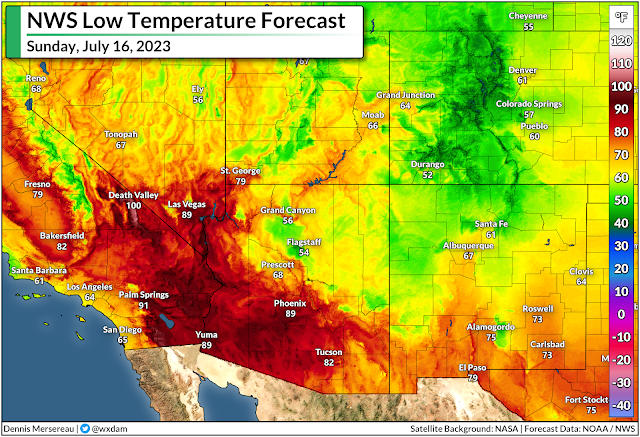The National Weather Service office in Phoenix, Arizona, didn't mince words last Friday.
We are still anticipating this current heat wave to continue through next week and likely beyond with it rivaling some of the worst heat waves this area has ever seen.[...] this should go down as one of the longest, if not the longest duration heat wave this area has ever seen.
That's no small feat coming from a part of the country where the average high temperature in July soars above the century mark.
Unfortunately, the dire predictions are panning out as we head into the weekend.
A near-record ridge of high pressure parked over the region is cranking the heat far above normal levels. Ridges of high pressure foster sinking air, which warms up and dries out as it sinks toward the ground. The result is a terrible streak of very high temperatures that's approaching the upper bounds of what we've ever measured in the desert southwest.
El Paso, Texas, is in the midst of its longest streak of triple-digit days on record. As of Friday, July 13, the city has seen 29 consecutive days with a high temperature of 100°F or hotter, shattering the previous record of 23 days set back in July 1994. The record will keep on growing through next week.
Phoenix, Arizona, tied its second-hottest low temperature on record on Thursday when the city's temperature bottomed out at 95°F early in the morning. Friday marked their 15th consecutive day with a high temperature of 110°F or hotter, and they'll easily beat their all-time record of 18 days with supercentenarian highs by early next week.
The low temperature in Death Valley, California, will only dip to a cool 100°F on Sunday morning.
The world's deadliest weather disaster isn't hurricanes, or tornadoes, or floods—it's extreme heat. Brushing off excessively high temperatures is easy and tempting from an air conditioned office, but consider how many people here at home and around the world lack simple things like air conditioning or clean water.
I wrote about the phenomenon of folks brushing off extreme heat a few years ago:
It's called survivorship bias. Lots and lots of people died before air conditioning as a direct result of not having air conditioning.It's sort of like the folks who scream "why do we need to coddle kids with all these safety features, I grew up just fine!" Sure, you may have turned out okay! But cemeteries are too full of too many little kids who, it turns out, couldn't get by without car seats or vaccines or wall-fastened dressers or unleaded paint on the windowsill.Even with air conditioning all over the place today, heat is still the leading weather-related cause of death in the United States. One bad heat wave can kill hundreds of people, a higher toll than years and years of tragic tornadoes combined. Last year's awful heat wave in the Pacific Northwest was Washington's deadliest weather disaster on record, and it killed nearly 600 people up in British Columbia.Lots of people died before air conditioning. Lots of people still die without air conditioning. Consider yourself fortunate if you don't have to worry about that.
People are acclimated to high heat in this part of the country, of course, but no humans are capable of withstanding day after day, week after week, of extreme heat of this caliber. Without access to air conditioning, shade, and proper hydration, the human body starts shutting down after such prolonged exposure to extreme heat. Similar heat waves have killed dozens or hundreds of people in past decades.
[Satellite image via NOAA]
You can follow me on Facebook, Mastodon, Twitter, Instagram, or send me an email.
Please consider subscribing to my Patreon. Your support helps me write engaging, hype-free weather coverage—no fretting over ad revenue, no chasing viral clicks. Just the weather.
Please consider subscribing to my Patreon. Your support helps me write engaging, hype-free weather coverage—no fretting over ad revenue, no chasing viral clicks. Just the weather.










0 comments: